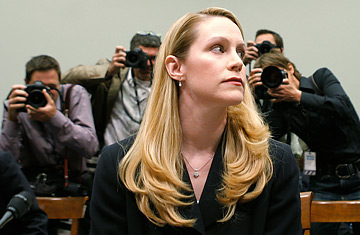
Monica Goodling appears before the House Judiciary Committee, May 23, 2007
White House aides couldn't have been more pleased at the failure of the Democrats' attempt to get a no-confidence vote against Attorney General Alberto Gonzales this week. While the Democrats managed to win over a few Republicans, bringing to nine the number of G.O.P. Senators now publicly opposed to Gonzales' continued service as head of the Justice Department, the overall effect of the maneuver was to make it look as if the effort to bring Gonzales down is stalling. But the relief at the White House and Justice may be premature.
On Wednesday, the Justice Department's Inspector General, Glenn Fine, told Senators Patrick Leahy and Arlen Specter, the top Democrat and Republican on the Senate Judiciary committee, that he is looking into a controversial conversation Gonzales had with his former counselor, Monica Goodling, as she left the Department in April. Fine's conclusions are likely to be more important than those of the Senate: he launched a wide-ranging investigation into the firing of U.S. attorneys last year, and a negative report from him could hurt Gonzales in ways Congress couldn't. Fine's inclusion of the Goodling conversation in his probe signals that he is looking directly at Gonzales' role in the entire matter.
Late last month, Goodling testified before the House Judiciary Committee that she requested the April meeting with Gonzales to ask for a transfer because of the unfolding scandal surrounding the firing of U.S. attorneys last year. Gonzales told her he'd think about the request, and then suddenly began unveiling his recollection of the firings. "He laid out a little bit of it, and then he asked me if I had any reaction to his iteration," Goodling testified. She told the members of the committee that the conversation had made her "uncomfortable" because she thought both of them might be called to talk about the matter elsewhere.
Democratic Senators have suggested that Gonzales may have been trying to coach Goodling ahead of Congressional inquiries into the matter. Sheldon Whitehouse of Rhode Island said the conversation had the whiff of obstruction of justice. Leahy and Specter wrote Fine on June 5 to ask whether the Goodling conversation was, in fact, part of the Inspector General's investigation. Fine, together with the head of Justice's Office of Professional Responsibility, responded in a letter Wednesday, which dryly said, "This is to confirm that the scope of our investigation does include this matter."
Gonzales's defenders say he did nothing wrong in the conversation. "The Attorney General has never attempted to influence or shape the testimony or public statements of any witness in this matter, including Ms. Goodling," said Justice spokesman Dean Boyd. "The statements made by the Attorney General during this meeting were intended only to comfort her in a very difficult period of her life."
The news of Fine's interest in the Goodling conversation comes at a time when the Administration had been hoping to get past the scandal. Gonzales and the White House have been fighting running battles with the Democrats for the better part of three months now and the failed no-confidence vote had been seen by some as a turning point. Republicans argued that it was the last gasp of what they view as a political witch hunt. Democrats said the vote won them new public support from Republicans and that it was simply part of a long, steady stream of moves designed to keep the pressure on Gonzales. This week the Senate Judiciary committee issued subpoenas for two key White House officials as part of that effort. The subpoenas aim to pry more information on the firing of former U.S. Attorney Bud Cummins in Missouri and his replacement by Tim Griffin, a long-time operative for Karl Rove.
Just how much trouble the Goodling conversation alone will make for Gonzales remains to be seen. When pressed by the House judiciary committee, Goodling said that while she was uncomfortable, she did not think that Gonzales was trying to shape her testimony. Democratic Representative Artur Davis of Alabama asked her, "Do you think, Ms. Goodling, the Attorney General was trying to shape your recollection?" Goodling responded, "No."
But the fact that Fine himself is looking into it is a troubling development for Gonzales. A former Rhodes Scholar and Harvard Law School graduate, Fine is well respected in Washington and has the kind of credibility that could damage Gonzales and the Bush Administration in ways that political players, like Leahy and New York Senator Chuck Schumer can't. Fine's office told the National Journal recently that he would issue a report "expeditiously."
